
How turbulent times have shaped the USC Class of 2022
COMMENCEMENT 2022: COVID-19, a racial reckoning, the rise in anti-Asian hate crimes and anti-LGBT laws created a challenging climate for these students’ academic journeys.
Jephtha Prempeh didn’t expect to take a gap year in the middle of their academic career at USC.
But when the COVID-19 pandemic hit, the Bronx native immediately had trouble transitioning to online classes. Then Prempeh’s academic focus was further disrupted by the racial reckoning that followed the murder in May 2020 of George Floyd, a Black man killed by a white police officer in Minneapolis.
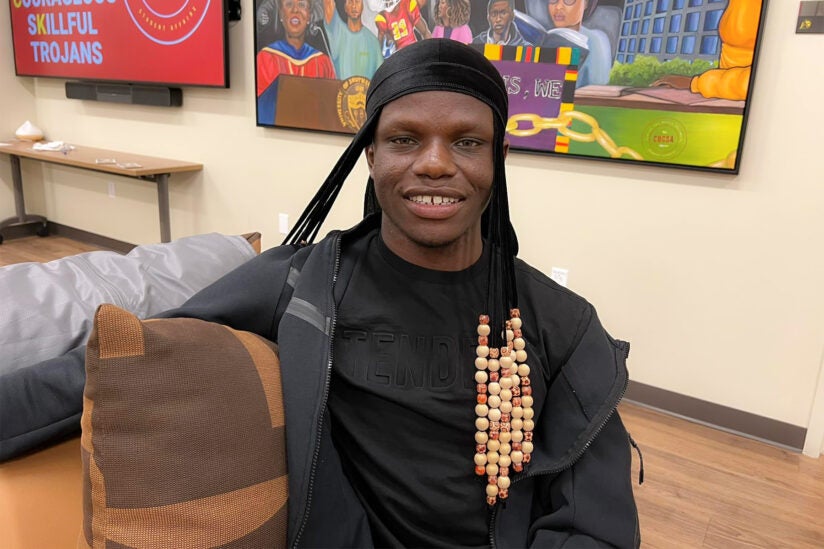
“The way the pandemic and revolutionary upheaval with Black Lives Matter and the murder of George Floyd coincided with each other gave me the space and time to really think about — on my own — what I want to do with my future,” said Prempeh, who graduates from the USC Dornsife College of Letters, Arts and Sciences this week with a degree in non-governmental organizations and social change. “It really reshaped my perspective.”
The upheaval of the past few years has redefined the USC experience not just for Prempeh, but for all members of the Class of 2022. Early in the pandemic, the Floyd killing ignited a racial reckoning that continues, while anti-Asian hate crimes spiked. In addition, already vulnerable LGBTQ+ students have felt under siege by the onslaught of bills and laws targeting their rights.
Looking to previous generations of young people
Christopher Manning, USC’s chief inclusion and diversity officer, hopes students will look to the example set by past generations of young people who lived through such traumatic times as World War II, the threat of nuclear annihilation during the Cold War, and the Vietnam War.
“History tells us that surviving earth-shaking and earth-shattering events in one’s formative years give you the potential to do really great things in the world,” Manning said. “As they enter the next phase of their life, students should be inspired by their own ability to survive — and our ability to survive as a country. And never forget that inherent ability of humankind to take steps to become better if and only if we choose to do it.”
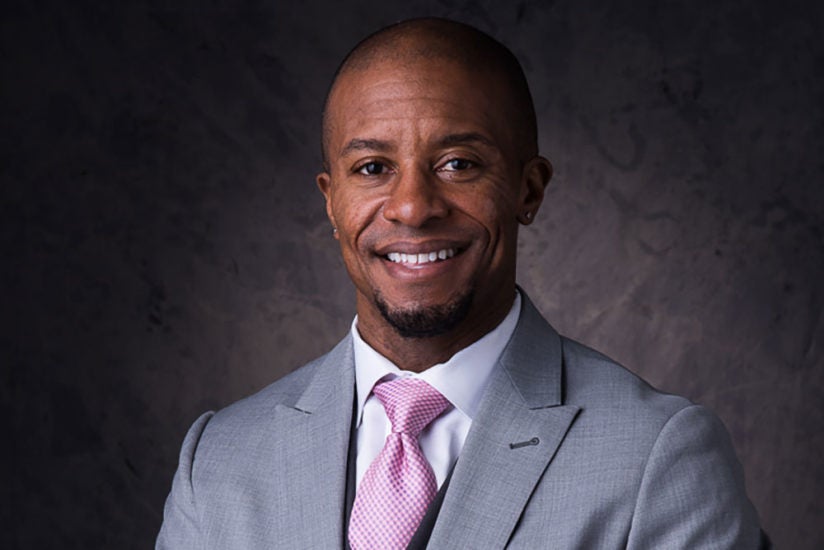
In the wake of Floyd’s murder, Prempeh was among the students who organized, marched and gathered signatures on petitions in an effort to make USC a safer and more welcoming place for Black students.
“That really changed the trajectory of my academic career,” Prempeh said. “I had to campaign for my grief and find ways to get to people who could actually make some sort of change.”
Prempeh, a dance minor and music production minor, felt frustrated and burned out after a few months and decided to take a break from school. Prempeh returned to campus a year later as committed to social change as ever before, but the time away had made Prempeh realize they wanted to follow a different path to that goal.
“I had been thinking, ‘What can I do that is still pushing my agenda but is not going to exhaust me?’” Prempeh explained while taking a lunch break inside the Center for Black Cultural and Student Affairs a week before finals. “A lot of my friends were creating art and speaking out on things that were important, and I just wanted to bring it all together in a place that would be positive, nurturing, restorative.”
As a student of nongovernmental organizations and social change, Prempeh said they learned that media representation is one of the biggest drivers of social change. To that end, Prempeh created PEWM (Proud of Everything We Make), an independently published magazine aimed at recentering pop culture from a diverse point of view.
“I was so fortunate we came back to campus this year because I wanted to do these things physically, within community,” Prempeh said. “One of our big things is creating conversations between people so they can bridge gaps in understanding because it shouldn’t take a big, crazy moment to jostle everyone.”
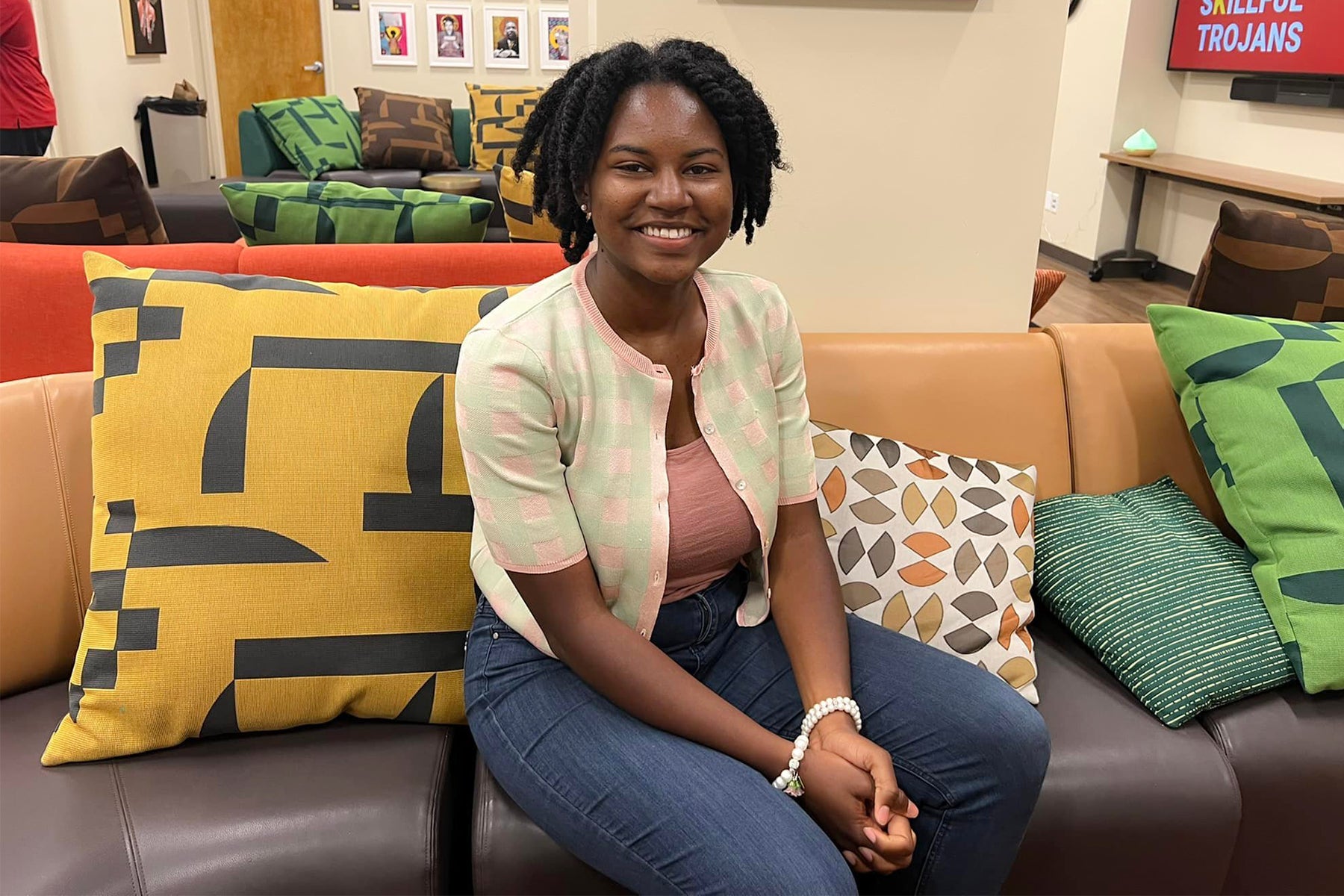
Increased awareness: What college students think
Jessica Brown, who will graduate this week from the USC Viterbi School of Engineering with a Bachelor of Science in civil engineering with an emphasis in building science, didn’t allow world events to slow her academic progress. But she became increasingly mindful of her status as the only Black student in her major within her year.
“There have been conversations about how to make USC a more diverse and inclusive place, and I feel like the university is taking steps in recognizing its role in these systemic problems,” Brown said. “As a student in a program that’s not that diverse in terms of the demographics, I definitely feel like the university has made efforts to make my experience better.”
From the start, Brown was determined to not feel like an outsider. She became president of the USC chapter of the Alpha Kappa Alpha sorority — the first intercollegiate historically Black sorority — and a regional vice chair of the National Society of Black Engineers.
“I’ve had a positive experience at USC, but I have many friends who have had unfortunate experiences,” Brown said. “I’ve been interested in conversations that have taken place about how to make the school a more diverse and inclusive place, and this introspection is something I’ve been observing and find valuable.”
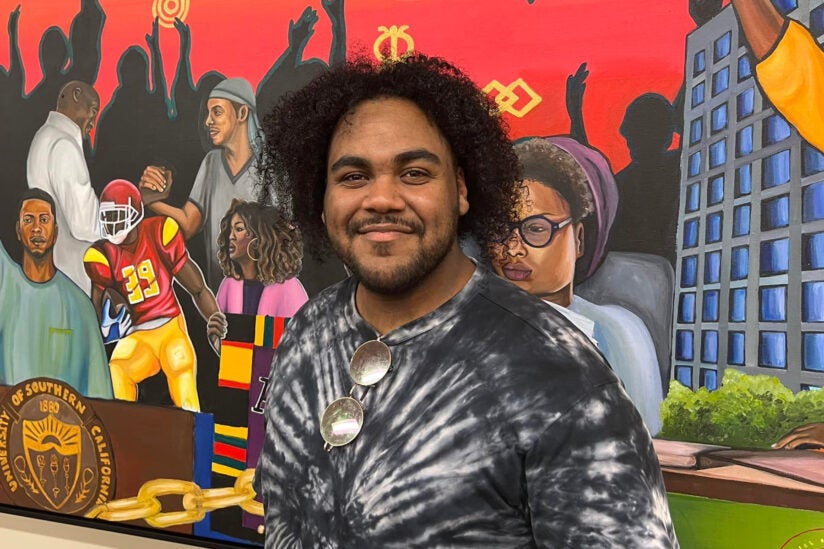
Lasting impact of the racial reckoning?
Harrison Forch, who is graduating from USC Viterbi with a Bachelor of Science degree in computer engineering and computer science, remains hopeful that the racial reckoning will have a lasting impact not only at USC, but across the United States.
He had returned to live with his parents in Seattle during the pandemic. While continuing his USC classes online, he noticed an immediate change in the aftermath of Floyd’s murder.
“I remember my dad telling me that, for the first time in his life, white people saw him,” Forch said. “There have been countless numbers of times, for him and me, that we have felt literally physically invisible in public. But around 2020, my dad noticed that people would hold a door open for him — the physical act of recognizing somebody in the space.”
Forch pointed out that there is still hard work to be done beyond marches and panels.
“When it comes to social change, there needs to be a place for people to feel their emotions and process them, but a protest is just a start,” he said. “The stuff that ingrains permanent, systematic change is creating action plans and doing the stuff that nobody will ever see and nobody will ever get any credit for.”
The racial reckoning affecting these Black students occurred as Asian Americans began experiencing more threats and harassment than any other racial or ethnic group in the United States, according to the USC Center for Economic and Social Research’s Understanding Coronavirus in America tracking survey taken between April 1, 2020 and March 16, 2021.
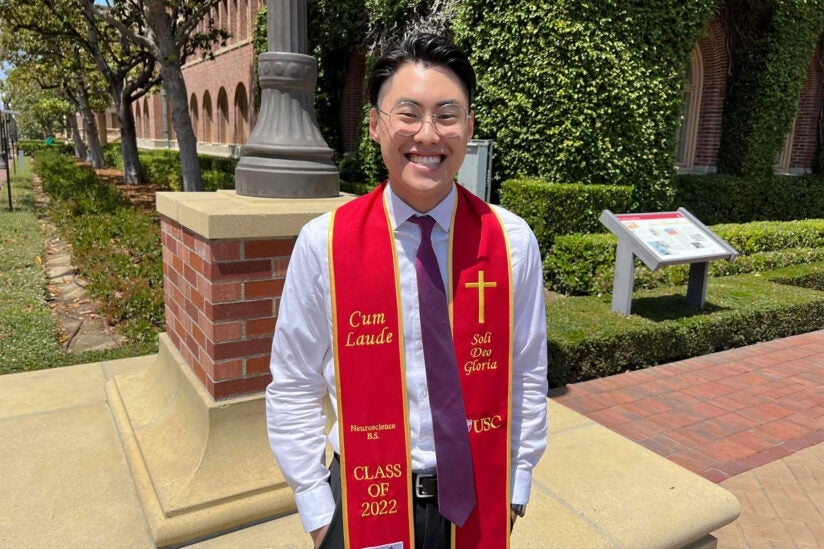
Anti-Asian slur: ‘It really hurt’
Agustin Kang said “it really hurt” when he found out someone had hurled an anti-Asian slur at a USC classmate in Koreatown during the pandemic’s early months.
“I feel like as a Korean, I’m really proud of my culture, and we don’t mean any harm,” Kang said. “We’re here, and we’re just fellow immigrants like other immigrants here. We’re here to live an American life, to live a successful life.”
While the harassments and threats to his community were deeply upsetting, Kang felt from the start that education and understanding are the key to more racial harmony.
“I would want to help people understand,” explained the graduating senior. “If there’s any way for me to help them understand my culture, the things that we do and why we do them, and where we came from, this could help get rid of some of the finger-pointing and the hatred.”
That’s why he has been heartened by an increase in Asian, Pacific Islander and other cultural events taking place on campus.
“Becoming aware that there is this hate and this culture of finger-pointing, this school has been able to help,” he said. “They are definitely taking steps to become more united and having people see these different cultures.”
Kang, a neuroscience major, moved back to his parents’ house in Santa Clarita in 2020 and has been commuting to USC since in-person classes resumed.
“The pandemic and not being able to be on campus physically and to be with my friends, emotionally, there were a lot of struggles,” he said. “But the way we handled the situation and the way we’ve come out of it has been very impactful for me. It’s made me aware of how to make this campus safer and healthier. It’s been eye-opening, and I’m proud of this campus — that we’ve been able to come out of it stronger.”
The experiences of the past two years in particular have helped Kang to broaden his own perspective.
“I realize how narrow-minded I was, how small my bubble was,” he said. “I only knew a certain point of view. But because of the pandemic and all that took place during that time, I’m more open and aware of what’s going on and I’m asking, ‘How can I help?’ As USC students, I feel like we can have an impact because we have a voice. We can really change our community.”
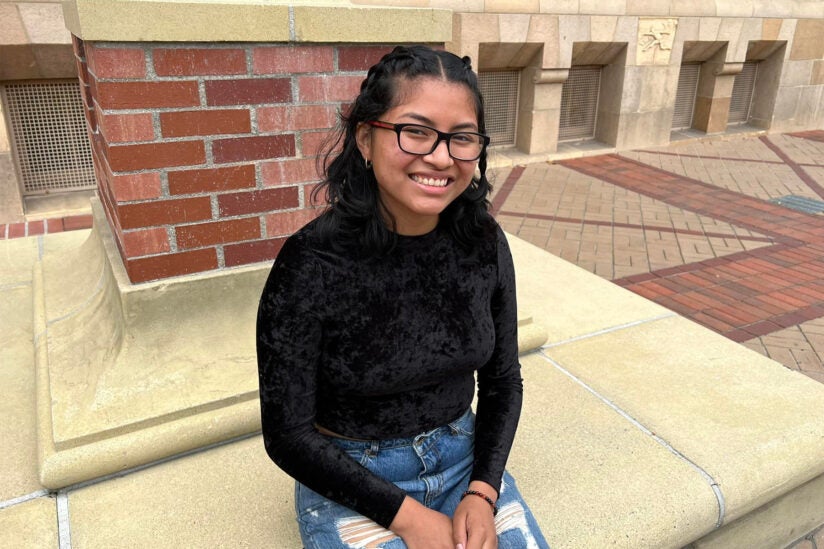
What college students think: Leaning on each other for support
Esmeralda Bravo-Bonilla and other LGBTQ+ students have had to lean on each other for support in recent months.
They have felt traumatized as a wave of anti-LGBTQ+ bills are being proposed and laws are being passed around the country. These include Florida’s so-called “Don’t Say Gay” law, which bans classroom discussion about sexual orientation or gender identity in kindergarten through third grade.
“Even with everything going on in the country, this community at USC has been here to support me,” Bravo-Bonilla said. “It’s definitely very difficult, but I’ve been able to really talk about it and to really work through our feelings and emotions in a space where everybody here has similar emotions and is going through similar things.”
Bravo-Bonilla will receive her bachelor’s degree this week in gender and sexuality studies from USC Dornsife. She is grateful that she was able to spend her final semester working as an intern at USC’s Lesbian Gay Bisexual Transgender Plus Student Center.
“Being in this space, there’s always community, there’s always people to talk with,” she said. “It’s been really difficult, but it’s been one of the more supportive semesters in a while.”
But she worries that “there’s always something going on somewhere with anti-LGBTQ legislation and hate crimes and discrimination against the LGBT community.”
This comes as Bravo-Bonilla continues to process the trauma from the pandemic when she had to abruptly move out of university housing and live with a sister. She says her mental health declined — but she managed to stay on track with her studies.
“The ramifications of the past two years are still with me today,” she said. “I feel good about graduation considering all I had to go through to get here. But I almost feel like I need more time here at USC. I need to have back all that time that I was online, those years when we weren’t here in person. But I know my time here is done and there’s still so much more life to live.”



